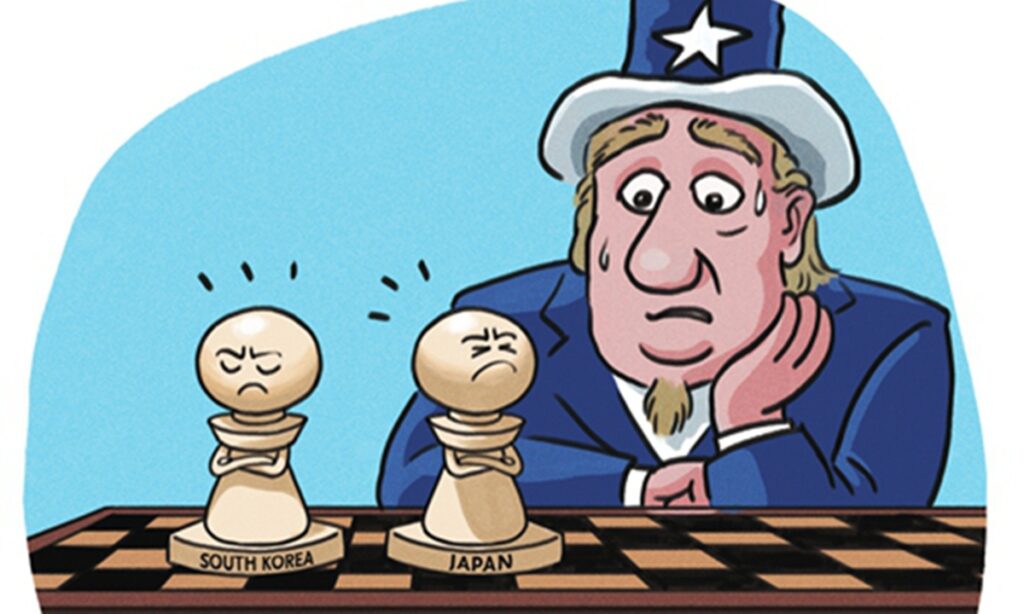With the US, Japan and South Korea boosting military linkage, tension is growing in Northeast Asia. Ahead of the upcoming virtual meeting of foreign ministers from the US, South Korea and Japan, a prelude to a summit between their leaders, North Korean leader Kim Jong-un has inspected major munitions factories and called to boost missile production capability, KCNA reported on Monday.
Pyongyang’s move is seen as response to the US-Japan-South Korea military tie-up. Meanwhile, Chinese Defense Ministry announced on Monday that Chinese State Councilor and Defense Minister Li Shangfu will visit Russia, attend the Moscow Conference on International Security and visit Belarus from August 14 to 19.
Analysts pointed out the Asia-Pacific region and even the whole world need to be vigilant about the US’ attempt to create a “mini-NATO” in Asia, which would pose a huge threat to regional peace and stability. They also noted that moves by the US and its Asia allies may prompt regional powers such as China and Russia to strengthen substantive strategic cooperation to stabilize the situation.
US President Joe Biden is set to host South Korean President Yoon Suk-yeol and Japanese Prime Minister Fumio Kishida for a trilateral summit at Camp David in Maryland on August 18 (local time), the first stand-alone trilateral summit arranged solely for their shared agenda, according to South Korea’s Yonhap News Agency.
Ahead of that, US Secretary of State Antony Blinken is expected to hold a virtual meeting with Japanese foreign minister Yoshimasa Hayashi and South Korean foreign minister Park Jin on Monday, according to the US State Department.
Their virtual meeting will mark that Blinken has talked with his Seoul and Tokyo counterparts in three consecutive months.
Kim Tae-hyo, South Korean deputy national security director, said at a press briefing on Sunday that the leaders will discuss “threats” from North Korea and the core framework of future trilateral security cooperation will be created and institutionalized through the summit. The three nations are expected to launch multiple consultative bodies in the fields of military information sharing, security and the economy, according to South Korean media.
Citing South Korean officials, Yonhap described the summit as marking a “historic turning point” in the trilateral cooperation among Seoul, Washington and Tokyo.
Chinese military expert Song Zhongping told the Global Times on Monday that the US and its Asia allies are establishing a joint defense mechanism, similar to NATO, to strengthen joint capabilities in military command, early warning, missile technology and other areas.
The move is ostensibly aimed at North Korea, but its real target is China, Song said, noting that the closer, normalized and institutionalized military cooperation among the three countries will lead to an escalation of the situation in Northeast Asia and even the Asia- Pacific region.
The US, Japan and South Korea are moving from two bilateral alliances centered on the US to a trilateral alliance, Li Haidong, a professor at the China Foreign Affairs University, told the Global Times on Monday.
This is a step by the US to build a “mini NATO” in the Asia-Pacific region, and it shows the way the US and its allies strengthen ties is through creating instability, division and even crisis, which means regional countries and even the whole world must be vigilant, Li said.
Japan’s Yomiuri newspaper said on Sunday that the US and Japan are expected to sign an agreement to jointly develop an interceptor missile in an effort to counter hypersonic warheads developed by China, Russia and North Korea. Japan and the US also plan to strengthen cooperation to enhance intelligence-gathering capabilities.
On July 16, Japan, South Korea and the US held a joint naval missile defense exercise. Two days later, the US deployed a nuclear-capable submarine to South Korea for the first time in four decades.
According to Li Haidong, the aggressive moves by the US and its Asia allies will become a driving force for China and Russia to further consolidate and deepen strategic cooperation in the Asia-Pacific region and globally.
China and Russia need to strengthen strategic coordination and cooperation in many aspects, and the content must be substantive, he added.
China is an important force to maintain stability in the Asia-Pacific region, but China also needs to be well-prepared to deal with emergencies and even military conflicts ignited by US and its allies, Song noted.
(Global Times)




